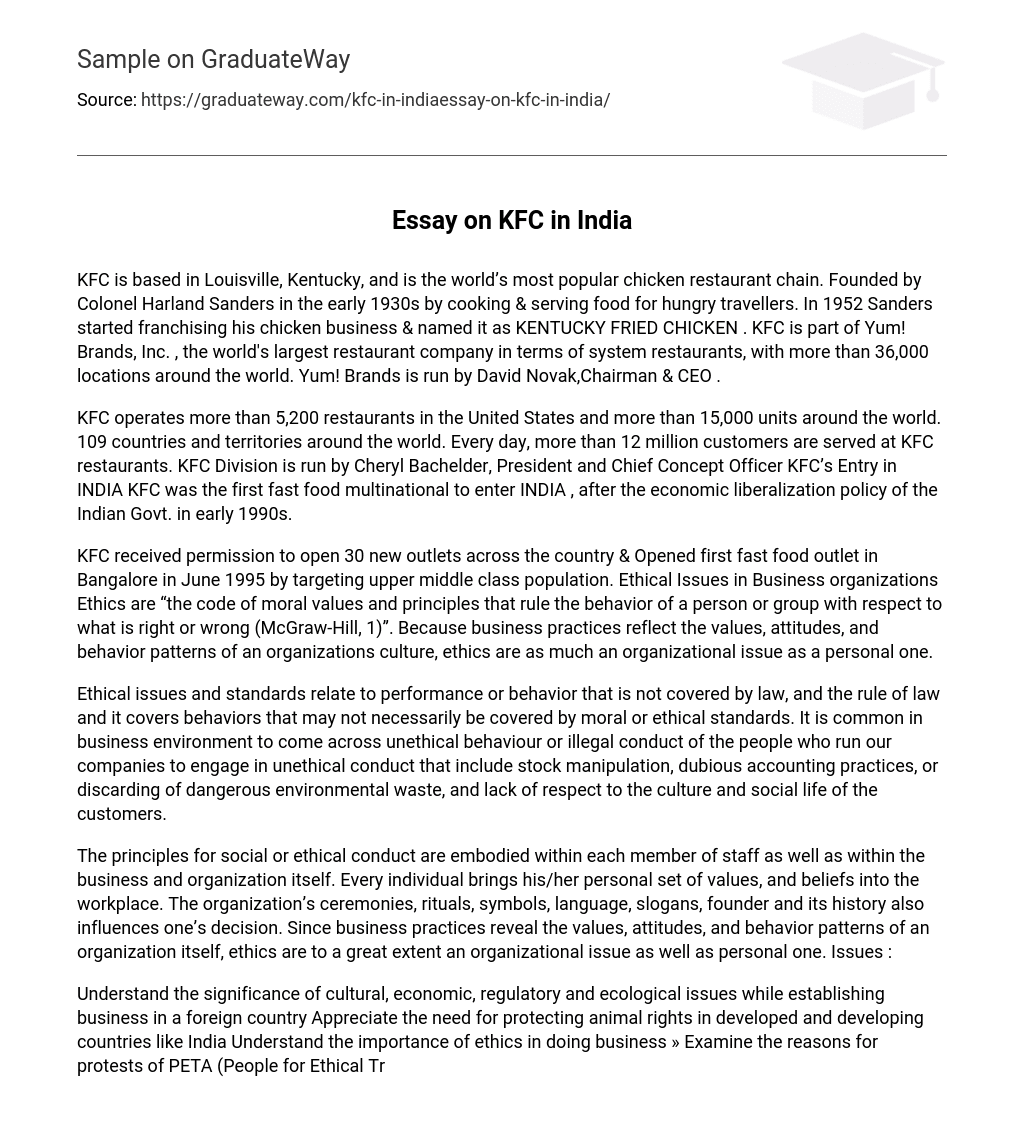KFC is based in Louisville, Kentucky, and is the world’s most popular chicken restaurant chain. Founded by Colonel Harland Sanders in the early 1930s by cooking & serving food for hungry travellers. In 1952 Sanders started franchising his chicken business & named it as KENTUCKY FRIED CHICKEN . KFC is part of Yum! Brands, Inc. , the world’s largest restaurant company in terms of system restaurants, with more than 36,000 locations around the world. Yum! Brands is run by David Novak,Chairman & CEO .
KFC operates more than 5,200 restaurants in the United States and more than 15,000 units around the world. 109 countries and territories around the world. Every day, more than 12 million customers are served at KFC restaurants. KFC Division is run by Cheryl Bachelder, President and Chief Concept Officer KFC’s Entry in INDIA KFC was the first fast food multinational to enter INDIA , after the economic liberalization policy of the Indian Govt. in early 1990s.
KFC received permission to open 30 new outlets across the country & Opened first fast food outlet in Bangalore in June 1995 by targeting upper middle class population. Ethical Issues in Business organizations Ethics are “the code of moral values and principles that rule the behavior of a person or group with respect to what is right or wrong (McGraw-Hill, 1)”. Because business practices reflect the values, attitudes, and behavior patterns of an organizations culture, ethics are as much an organizational issue as a personal one.
Ethical issues and standards relate to performance or behavior that is not covered by law, and the rule of law and it covers behaviors that may not necessarily be covered by moral or ethical standards. It is common in business environment to come across unethical behaviour or illegal conduct of the people who run our companies to engage in unethical conduct that include stock manipulation, dubious accounting practices, or discarding of dangerous environmental waste, and lack of respect to the culture and social life of the customers.
The principles for social or ethical conduct are embodied within each member of staff as well as within the business and organization itself. Every individual brings his/her personal set of values, and beliefs into the workplace. The organization’s ceremonies, rituals, symbols, language, slogans, founder and its history also influences one’s decision. Since business practices reveal the values, attitudes, and behavior patterns of an organization itself, ethics are to a great extent an organizational issue as well as personal one. Issues :
Understand the significance of cultural, economic, regulatory and ecological issues while establishing business in a foreign country Appreciate the need for protecting animal rights in developed and developing countries like India Understand the importance of ethics in doing business » Examine the reasons for protests of PETA (People for Ethical Treatment of Animals ) Identify solutions for KFC’s problems in India Problems for KFC Protests by farmers led by the Karnataka Rajya Ryote Sangha(KRRS) & the farmers leader was Nanjundaswamy who used the term ‘junk food’ against KFC.
Protests by cultural & Economic activists . Protests by PETA in the late 1990s. Support of celebrities in against of KFC SWOT analysis strengths weaknesses non ethical business practice peta protest KRRS protest msg flavour in chicken opportunity retail boom in india indians youth are adopting western culture indian economy cosmopolitan rapid development threats msg chicken flavour peta like organizations political parties protesting for junk food protest support from famous personalities like anil kumble,aditi govithrikar,john abraham etc understand the culture, regulatory& ecological issues. nderstand the importance of ethics in doing business examine the reasons for protests of peta identify solutions for kfc’s problems in india REASONS WHY PETA PROTESTED a. Overcrowded farm environment The chickens are stuffed by tens of thousands into overcrowded sheds where they hardly find space to move freely. To saves pace and avoid chicken hurting each other, the sensitive chicken beaks are cut off with hot blade without giving any painkillers. Overcrowding and poor litter quality in the farms also caused painful ammonia burns on the chickens.
The injured chickens received no treatment and had to bear the pain throughout their life. b. Improper breeding Birds are fed genetically modified feed in order to accelerate their growth rate. As a result hey suffer from ailments such as extreme obesity and fatty livers and kidneys, heart attacks and other problems. c. Cruelty in the slaughter house The chickens are slaughtered before they are 6 weeks old. At the slaughter house, chickens are hung upside down and transferred through conveyor belts to the killing room fully conscious.
Too many chickens are dumped from the crates to the fast moving conveyor belt that caused the birds at the bottom to get suffocated. Unable to manage the large inflow of chickens, the workers threw away some chickens slamming them to the walls or floors. During the processing, to remove feathers, the live chickens are thrown into scalding-hot water. c. Frustrated Workers Due to poor wages and working conditions, employees used the chickens as a means to vent frustrations and alleviate boredom.
They twisted the bird’s heads off, spat tobacco into their eyes and mouths, spray-painted their faces, used them as footballs and squeezed their bodies so hard that the birds expelled faeces. CONCLUSION KFC should implement a farm level guideline & audit program – a program which is industry-leading in the areas of poultry care and handling, mainly for their suppliers in the broiler industry. Finally, we can understand from the case that every business organization should understand the importance of ethics by understanding the culture, regulatory & ecological issues in different countries.





